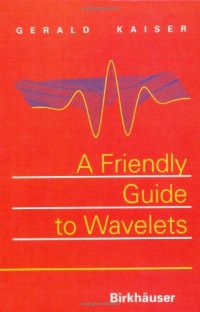
Ebook: A Friendly Guide to Wavelets
Author: Gerald Kaiser
- Genre: Mathematics // Wavelets and signal processing
- Year: 1994
- Publisher: Birkhäuser Boston
- Edition: 1
- Language: English
- pdf
Chapters 9-11, Physical Wavelets, are at a more advanced level and represent original research. They can be used as a text for a second-semester course or, when combined with Chapters 1 and 3, as a reference for a research seminar. Whereas the wavelets of Part I can be any functions of "time," physical wavelets are functions of space-time constrained by differential equations. In Chapter 9, wavelets specifically dedicated to Maxwell's equations are constructed. These wavelets are electromagnetic pulses parameterized by their point and time of emission or absorption, their duration, and the velocity of the emitter or absorber. The duration also acts as a scale parameter. We show that every electromagnetic wave can be composed from such wavelets. This fact is used in Chapter 10 to give a new formulation of electromagnetic imaging, such as radar, accompanied by a geometrical model for scattering based on conformal transformations. In Chapter 11, a similar set of wavelets is developed for acoustics. A relation is established at the fundamental level of differential equations between physical waves and time signals. This gives a one-to-one correspondence between physical wavelets and a particular family of time wavelets.